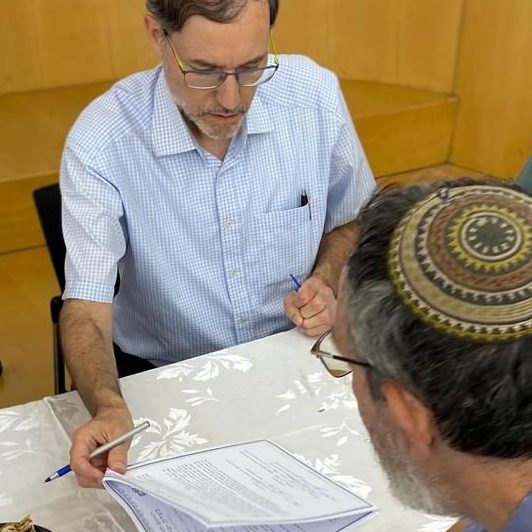Pledge of Compassion and Dignity
Halachic bill for Preventing agunah cases
What is the CWJ Pledge of Compassion and Dignity?
The Pledge of Compassion and Dignity, a halakhic document for couples who are married in accordance with Jewish law, prevents tragic agunah cases in which a husband is halachically unable to grant a get.
Why is it needed?
Every married Jewish woman runs the risk of becoming an agunah—a woman chained to her Jewish marriage until her husband freely grants her a get, a Jewish bill of divorce. Even when a couple is happily married, a tragic event can catapult a woman into a state of aginut (marital captivity) indefinitely.
This particularly heartbreaking type of aginut occurs in any situation in which a man has halchically lost the mental capacity to express his will and deliver a get of his own accord. This can happen, for example, if a husband sustains debilitating brain injuries as a result of an accident or illness, falls into a permanent non-responsive state or coma, or suffers from severe mental illness. It can also happen in times of war, if a married soldier is captured, goes missing in action, or if his body is never recovered.
In such cases, a woman is unable to move on with her life if she so desires; according to Jewish law, only a man can release a woman from marriage and not vice versa. As such, a woman remains forever chained to her unresponsive or missing husband, unable to move past this tragedy or remarry.
One such case infamously rocked the Israeli justice system in 2017, surrounding a young woman who became known as the “Agunah from Safed“, whose husband lay in a permanent vegetative state for nearly a decade following a motorcycle accident.
In recent years, many couples have turned to the Center for Women’s Justice seeking solutions to preempt such tragedies. It is standard to purchase insurance for our homes, our health, and our lives in order to better protect ourselves and our loved ones in case of unexpected and tragic turns of events. Similarly, many couples sign prenuptial agreements before marriage. In the same vein, happily married couples are seeking ways to prevent aginut.
How does it work?
To address this, CWJ drafted an innovative halakhic document, the “Pledge of Compassion and Dignity.” This postnuptial agreement, signed by the husband, is a halachic power of attorney appointing an agent to write and deliver a get to his wife in the event he is unable to do so himself. This get is written and delivered after a rabbinic court has been notified that the husband suffers an ongoing medical condition that renders him unable to grant a get, or if rabbinic court has ascertained that a couple has not been living together for longer than 18 months.
The Pledge of Compassion and Dignity is not an actual get, nor is it a conditional get. Rather, it is an appointment of an agent by the husband to act on his behalf.
Is it rabbinically approved?
Rabbinic Approval
Read an in-depth halachic tshuva about the halachic bill by Rabbi Yoni Rosensweig

This halachic bill was drafted by CWJ under the tutelage, encouragement, and direction of respected Israeli halakhic authorities: Rabbi David Bigman, Rosh Yeshiva of Maale Gilboa; Rabbi Yoni Rosenzweig, former Rosh Yeshiva of Shvut Yisrael in Efrat, congregational rabbi in Beit Shemesh, and educator at Midreshet Lindenbaum; and Halakhic Expert Malka Puterkovsky of Ein Prat Yeshiva, Misdreshet Lindenbaum, Beit Midrash Migdal Oz. All encourage couples to sign the CWJ postnup.
While innovative, this type of document is far from new. A similar document was used by Rabbi Yitzchak Herzog zt”l, Ashkenazi Chief Rabbi of British Mandate Palestine and subsequently of the State of Israel, and Rabbi Shlomo Goren zt”l, founder and head of the IDF Rabbinate and later Israeli Ashkenazi Chief Rabbi. Out of concern for the wives of soldiers, Rabbi Herzog required married soldiers in the Jewish Brigade to sign such a document before going out to battle during World War II, and after the establishment of the state, Rabbi Goren called on married IDF soldiers to do so. The IDF’s Chief of Staff Directive 34.0401 enables soldiers to sign one as well.
Does Israel’s State Rabbinical Court endorse CWJ’s Pledge of Compassion and Dignity? While Israel’s State Rabbinate does not condone any type of halachic pre- or postnuptial agreement on principle, in practice, the rabbinic courts have been much more open to implementing halachic solutions when a severe medically-induced or military agunah case comes before them (in contrast with cases of deliberate get refusal). Absent documents such as the Pledge of Compassion and Dignity, the court is very limited in their halachic options when faced with an incapacitated or missing husband. Therefore, it is advisable for all couples to sign the Pledge of Compassion and Dignity, ensuring greater halachic recourse in the event it is ever needed.
How do you sign the agreement?
Download and print the agreement
Sign in the presence of two halachic witnesses
Scan and upload to the site
Signing the Pledge of Compassion and Dignity is simple:
- Print the Pledge of Compassion and Dignity.
- The husband signs the document in the presence of two witnesses, who also sign it. The witnesses must be kosher in terms of halacha—this means two observant men who are not related to each other nor related to either spouse.
- Scan and upload a copy of the agreement to the site, for safekeeping. The original document should be kept in a safe place, such as where the ketubah or other important documents are stored.
Upload a signed agreement
After you’ve signed the agreement, scan and upload a digital copy to our site. Keep your original agreement in a safe place. That’s it!
Our goal is to ensure that every loving Jewish couple can conduct their lives with dignity and compassion, especially when tragedy strikes. Ultimately, CWJ aims to immunize all Jewish women from the chains of aginut.
Sign it! Forget about. We pray that you never need it.
